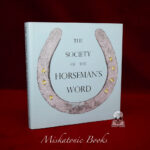Need news faster? Add our ‘Daily Alerts’ newsletter for time-sensitive information like rare, limited edition titles just announced or back in stock. Also, we highlight flash 24-hour sales on select products. [Subscribe Here]
$79.00 — or $79.00 Original price was: $79.00.$19.75Current price is: $19.75. / month for 4 months
One of only 1000 limited edition hardcovers published in 2009, 183pp. Book is in fine condition.
Published by The Society of Esoteric Endeavour
Currently Unavailable
This product is not available at the moment.
Would you like to get notified when this product is in stock ?
Out of stock
This clandestine esoteric society flourished amongst ploughmen in Scotland from the end of the 18th Century until the early 20th. Its members were believed to have supernatural control over horses, and also women and were also associated with witchcraft. This book takes the reader on a journey into the mysteries of the brotherhood. First context is provided. Forget notions of dour Victorian morality. We learn from the disapproving pen of the one Scottish ploughman who left a substantial written record that his work mates drank hard, played hard and chased women. A ranting, hostile exposure is reproduced which is actually really instructive, providing what appears to be a 17th Century version of the ritual, very different from the full version. Then follows some surprisingly informative newspaper accounts written by members, an early (ranting but useful) exposure, an eyewitness account, relevant folksongs sung by the ploughmen and then the ceremony and lore of the Society.
The ceremony, which has never been previously published, is a surprise, as are the teachings of the Society. The ritual shows a transformation of freemasonry to the nature of ploughing with horses. The legend of Solomon’s temple is replaced with references to Hercules and other figures from Greek mythology as well as Gabriel, Lucifer and Old Nick, the classical references sometimes being very well informed. Also incorporated are folk traditions about the domestication of horses. It could be an extreme experience, being very rough, physically arduous and potentially very scary, involving an encounter with the Devil and mock execution. In the earliest form of the ritual Adam, after the fall, is given as the originator of ploughing, an important gives Cain and in the secret rituals and teachings it is Tubal Cain who, it is said, was the first horseman though he, we are told, was instructed by a woman! An appendices explores the nature and significance of Tubal Cain and his relevance to ploughmen, finding expressions of rebellion against the status quo. Whilst one comes to understand why the horseman’s word was associated with control of horses and power over women, true mysteries emerge.
In East Anglia supernatural control of horses was attributed to possession of a toad bone obtained though a frightful ritual. Whilst we learn that members of the Society of the Horsemen’s Word were accused of similar spellcraft, and some would aver to such practice, it is clear that the nature of the Society is very different. The candidate is repeatedly exhorted to treat his animals well (i.e not like he is treated in the ritual!) and is even required to challenge any brother mistreating a horse. His initiator also says “You might have been told before that Mankind was made in the image of the Almighty but his horsemen know that all creatures, great and small, were also made in the Allmighty’s image” As it flourished long before the R.S.P.C.A. was founded it may be, despite being entirely clandestine, the Society was the first British organisation to have an animal welfare agenda.
However the Society of the Horsmean’s Word is not entirely alien to the East Anglian tradition. An extract from the writings of an anonymous East Anglian poacher is included, as it evinces a similar celebration of Cain as found in the Scottish traditionm, the same write is also an important source concerniung the Toad Bone ritual.
The Society of Horsemen was multifunctional. To some degree it was an early form of trade union. Thus, it was a criminal conspiracy, contravening the same laws that saw the Tolpuddle Martyrs transported and numerous workers imprisoned. It had to be clandestine. Strikes were impossible, but they had sabotage. Possession of the Horseman’s Word was a mask for the use of scents and smells to control horses, so the farmer would literally be unable to get a horse out of stable or into harness, if a horseman in dispute had “reasted” the horse by means of secreting an aromatic substance.
| Weight | 3.00 lbs |
|---|---|
| Dimensions | 0.00 × 0.00 × 0.00 in |
 The Society of the Horseman's Grip and Word (The Society of the Horseman's Word)
The Society of the Horseman's Grip and Word (The Society of the Horseman's Word)
| 5 star | 0% | |
| 4 star | 0% | |
| 3 star | 0% | |
| 2 star | 0% | |
| 1 star | 0% |
Need news faster? Add our ‘Daily Alerts’ newsletter for time-sensitive information like rare, limited edition titles just announced or back in stock. Also, we highlight flash 24-hour sales on select products. [Subscribe Here]

Add this product to a collection.
0 lists
Manage